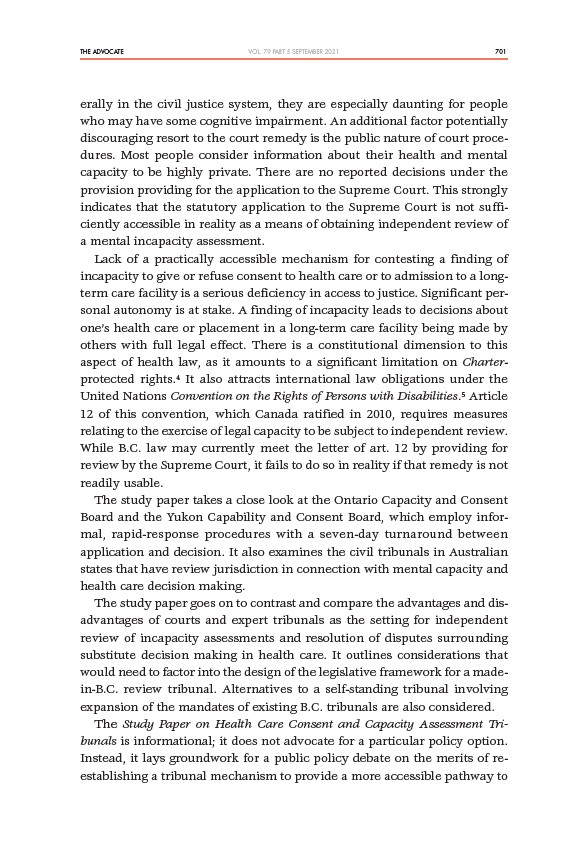
THE ADVOCATE 701
VOL. 79 PART 5 SEPTEMBER 2021
erally in the civil justice system, they are especially daunting for people
who may have some cognitive impairment. An additional factor potentially
discouraging resort to the court remedy is the public nature of court procedures.
Most people consider information about their health and mental
capacity to be highly private. There are no reported decisions under the
provision providing for the application to the Supreme Court. This strongly
indicates that the statutory application to the Supreme Court is not sufficiently
accessible in reality as a means of obtaining independent review of
a mental incapacity assessment.
Lack of a practically accessible mechanism for contesting a finding of
incapacity to give or refuse consent to health care or to admission to a longterm
care facility is a serious deficiency in access to justice. Significant personal
autonomy is at stake. A finding of incapacity leads to decisions about
one’s health care or placement in a long-term care facility being made by
others with full legal effect. There is a constitutional dimension to this
aspect of health law, as it amounts to a significant limitation on Charter-
protected rights.4 It also attracts international law obligations under the
United Nations Convention on the Rights of Persons with Disabilities.5 Article
12 of this convention, which Canada ratified in 2010, requires measures
relating to the exercise of legal capacity to be subject to independent review.
While B.C. law may currently meet the letter of art. 12 by providing for
review by the Supreme Court, it fails to do so in reality if that remedy is not
readily usable.
The study paper takes a close look at the Ontario Capacity and Consent
Board and the Yukon Capability and Consent Board, which employ informal,
rapid-response procedures with a seven-day turnaround between
application and decision. It also examines the civil tribunals in Australian
states that have review jurisdiction in connection with mental capacity and
health care decision making.
The study paper goes on to contrast and compare the advantages and disadvantages
of courts and expert tribunals as the setting for independent
review of incapacity assessments and resolution of disputes surrounding
substitute decision making in health care. It outlines considerations that
would need to factor into the design of the legislative framework for a madein
B.C. review tribunal. Alternatives to a self-standing tribunal involving
expansion of the mandates of existing B.C. tribunals are also considered.
The Study Paper on Health Care Consent and Capacity Assessment Tribunals
is informational; it does not advocate for a particular policy option.
Instead, it lays groundwork for a public policy debate on the merits of reestablishing
a tribunal mechanism to provide a more accessible pathway to